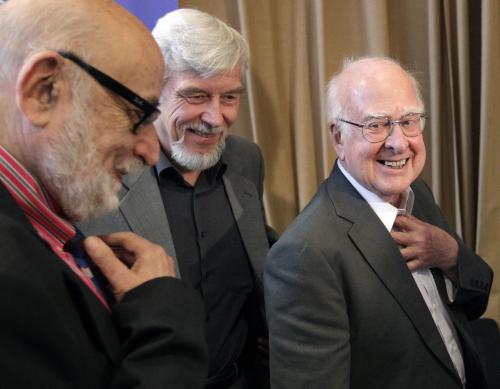Phuket Gazette World News: Higgs boson, key to the universe, wins Nobel physics prize

PHUKET MEDIA WATCH
– World news selected by Gazette editors for Phuket’s international communityHiggs boson, key to the universe, wins Nobel physics prize
Reuters / Phuket Gazette
PHUKET: Britain’s Peter Higgs and Francois Englert of Belgium won the Nobel Prize for physics on Tuesday for predicting the existence of the Higgs boson particle that explains how elementary matter attained the mass to form stars and planets.Half a century after their original work, the new building block of nature was finally detected in 2012 at the European Organization for Nuclear Research (CERN) centre’s giant, underground particle-smasher near Geneva.
The discovery was hailed as one of the most important in physics.
“I am overwhelmed to receive this award,” Higgs said in a statement issued by the University of Edinburgh, where he has worked for many years.
“I hope this recognition of fundamental science will help raise awareness of the value of blue-sky research.”
The two scientists had been favourites to share the 8 million Swedish crown (776.5 thousand pounds) prize after their theoretical work was vindicated by the CERN experiments.
To find the elusive particle, scientists at the Large Hadron Collider (LHC) had to pore over data from the wreckage of trillions of sub-atomic proton collisions.
The Higgs boson is the last piece of the Standard Model of physics that describes the fundamental make-up of the universe. Some commentators – though not scientists – have called it the “God particle”, for its role in turning the Big Bang into an ordered cosmos.
Higgs’ and Englert’s work shows how elementary particles inside atoms gain mass by interacting with an invisible field pervading all of space – and the more they interact, the heavier they become. The particle associated with the field is the Higgs boson.
Asked how it felt to be a Nobel winner, Englert told reporters by phone link to Stockholm: “You may imagine that this is not very unpleasant, of course. I am very, very happy to have the recognition of this extraordinary award.”
CERN Director General Rolf Heuer said he was “thrilled” that the Nobel prize had gone to particle physics.
He said the discovery of the Higgs boson at CERN last year marked “the culmination of decades of intellectual effort by many people around the world”.
The Royal Swedish Academy of Sciences said the prize went to Higgs and Englert for work fundamental to describing how the universe is constructed.
“According to the Standard Model, everything, from flowers and people to stars and planets, consists of just a few building blocks: matter particles.”
The will of Swedish dynamite millionaire Alfred Nobel limits the award to a maximum of three people. Yet six scientists published relevant papers in 1964 and thousands more have worked to detect the Higgs at the LHC.
Englert, 80, and his colleague Robert Brout – who died in 2011 – were first to publish; but 84-year-old Higgs followed just a couple of weeks later and was the first person to explicitly predict the existence of a new particle.
Similar proposals from American researchers Carl Hagen and Gerald Guralnik and Britain’s Tom Kibble appeared shortly afterwards.
— Phuket Gazette Editors
Latest Thailand News
Follow The Thaiger on Google News:
























